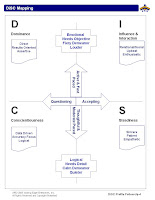
People communicate in dramatically different methods and styles. Almost as if there are sub-languages within each major language.
Image for a moment that, as the leader, someone in Berlin must perform a series of tasks to complete an objective. You speak in your native tongue of English. The Berliner smiles and nods their head approvingly. Communication complete and successful, right?
Just as different languages will lead to communication disconnects, different communication styles will often cause a lack of information flow and impede any real communication. Five or more years ago, the leader would often proclaim that “I am who I am” and it is your job to adapt. Sometimes it was followed by the gentle reminder “or leave.” More recently, successful leadership communication has become a more chameleon-like and adaptive approach.
The most commonly identified communication styles include direct, relational, low-key and detailed. The direct style often communicates in a very blunt, matter-of-fact or bullet point method. There is not a lot of language wasted on pleasantries and not a lot of background or supporting data is provided. Many times an assertive tone, implied urgency and rapid pacing comes along with the direct style.
By contrast, the relational communicator is often more wordy and those words are designed to build rapport. Usually, an upbeat demeanor and an eagerness to contact people are included in this style, as is an animation in non-verbal messages. These people are often labeled as chatty and optimistic.
The two additional styles of communication are a little harder to peg and pigeon hole. The low-key style is seen as reserved and speaks with a flat demeanor. They prefer a very soft, methodically paced and predictable approach to interpersonal communication. The detailed communicator is one that is data driven and often prefers a low-key tone. One unique trait of the detailed communicator is they will tend to answer the why question first and provide multiple sides of a point prior to communicating the resolution.
Now imagine for a moment all of these style thrown into a working environment and told to perform. Just as foreign languages cause disconnects, non-modified communication styles will do the same. A relational style leader attempts to communicate with a key team member who prefers a direct style. A low-key team member tries to interact with a direct style boss and soon loses her in minutiae.
The effective leader will bridge this disconnect with adaptive communication styles. He or she will read the style of the receiver very quickly and adapt appropriately. Quite simply, that means to know your communication style and learn how to read the style of others and adapt your style to that of the communication receiver. When that is done, messages will be transmitted with greater clarity and less misunderstanding. Subconsciously, team members recognize and appreciate the leader’s attempt at adaptation and better connection.
With people that you know, assessing their communication style is relatively easy. You have observed them. You have communicated with them previously. You have seen what style of communication works and does not work with them. What about new contacts and those people who are not as well known?
One technique that works with a high degree of accuracy is to assess the response to the “how are you?” question. Direct style communicators will respond quickly with one word and one word only. Relational communicators will provide between three and five words and many times, inquire about you. Low-key and high detail communicators will often express a brief pause while they assess the reason for your inquiry and the need to respond in an accurate manner.
The final word on communication style is back to the reason why adaptation is important. If, as a leader, your communication style disconnects with some people and the messages that you send are not followed, you lose. If you adapt your style and more people engage to the messages you send, you win.






No comments:
Post a Comment